Are you eating the right food for your age?
Did you know that as you get older, you should adjust what you eat? You'll be surprised at what some little differences to your diet can make!
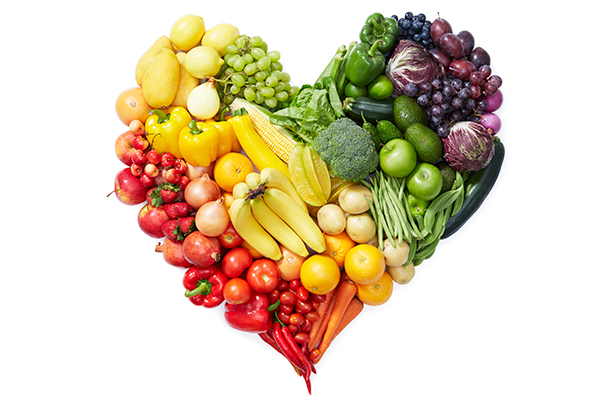
By and large we don't really change what we eat, regardless of our age. Sure, we may cut back a little on the booze as we settle down, perhaps we watch what we eat much more now than we did in our 20s, but our favourite meals tend to remain the same.
But did you know that you should actually change what you eat depending on how old you are? Different parts of your body and your health can benefit from different food if you're in your 20s, 30s, 40s, 50s and beyond. And if a slight change to your diet can make a big difference to how you feel, then it has to be worth it right? Here's what you should be eating for your age!
What to eat in your 20s
Recommended calories: Up to 2,000
Your metabolism is at its highest but booze, ready meals and takeaways can lead to weight problems. Limit yourself to three alcoholic drinks a night when you're out, and go for simple home-made dishes such as stir fries or pasta. Your bone density continues to grow into your late 20s, so it's important to get plenty of calcium into your diet to lower the risk of osteoporosis in later life. If you're so busy that you tend to skip breakfast, then it's possible that you could be missing fibre in your diet too.
Your food rules
- All types of fruit and veg: Five portions a day is recommended. If you're living in the fast lane, these are the foods that boost immunity and protect your health.
- Wholegrains: Try getting some wholegrains into your diet first thing with a fortified cereal or porridge.
- Calcium: To get the required amount of calcium you need to eat three servings from the dairy group every day. If you don't like dairy then try other calcium-rich foods such as broccoli, spinach and kale.
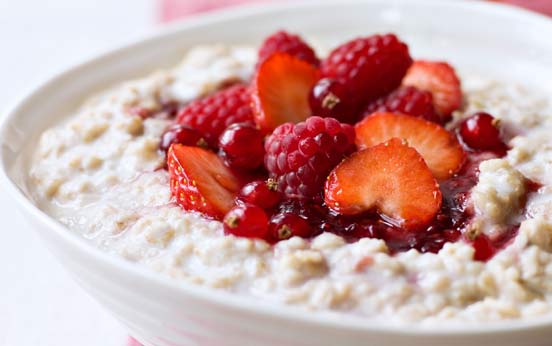
This berry blast porridge is a great way of getting wholegrains and a portion of fruit into your daily diet first thing.
What to eat in your 30s
Recommended calories: 1,940
Parenting advice, hot topics, best buys and family finance tips delivered straight to your inbox.
If you're considering starting a family then getting enough folic acid is key for the healthy development of your baby. If you've had kids the pounds can creep on, and you'll also start to lose muscle. Muscle uses up more calories than fat. Eat high fibre foods such as veg, and wholegrains which have plenty of bulk but fewer calories.
Your food rules
- Wholewheat pasta: Packed with slow releasing carbs which are perfect for prolonged energy when you're juggling work and family. Or go for pulses, porridge or grainy breads.
- Seeds: Sprinkle sesame or sunflower seeds over salads or cereal to bump up your magnesium. It's needed for energy release and may lessen PMS symptoms, which get worse in your 30s.
- Oily fish: Whether you're starting a family now or much later, get into the habit of eating oil-rich fish, eg salmon, herrings and sardines. They're rich in omega 3s, essential for a baby's brain development.
- Less salt: We should all be eating less than 6g salt a day, so be careful particularly when buying ready meals or sandwiches - always read the packet first. No more than 2.5g of salt for a main meal is what you should be aiming for.
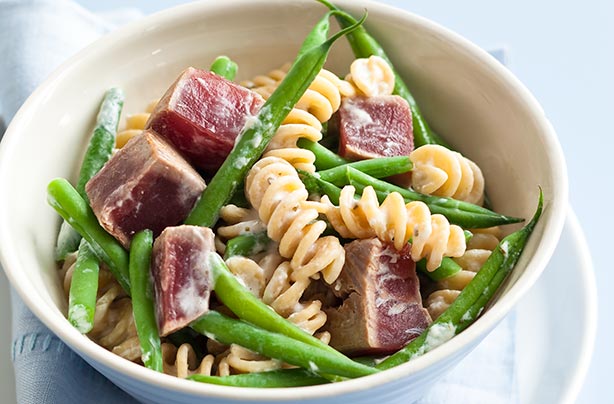
Tuna pasta is a great way of getting wholewheat and oily fish into your diet, so try this easy tuna pasta recipe today!
What to eat in your 40s
Recommended calories: 1,925
If you're inactive, you'll lose another five pounds or so of muscle this decade, while gaining fat at three times the rate as your metabolism slows slightly. Cutting back portion sizes just a little will make a big difference, as well as getting a good amount of exercise. Including more antioxidants in your diet is also important when it comes to protecting against things like cancer, heart disease and Alzheimer's.
Your food rules
- Soya: A great source of oestrogen-like isoflavones which may help you through the menopause, you should be getting 1-2 servings a day. Go for soya milk, tofu or TVP (textured vegetable protein).
- Berries: Several handfuls of brightly coloured berries a week, like blackberries, raspberries, blueberries and strawberries, is important because they're rich in antioxidants.
- Nuts: Rich in vitamin E, nuts contain another antioxidant which may reduce the risk of heart disease so be sure to eat one portion five times a week.
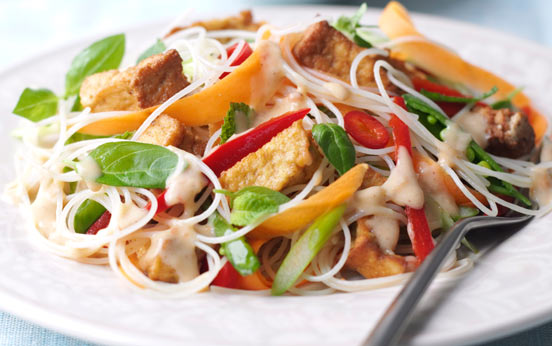
Foods that contain soy, like tofu, could help to reduce symptoms during the menopause. Try this tasty veggie satay noodle salad tonight.
What to eat in your 50s
Calories needed: 1,800-1,900
Hormonal changes make abdominal weight gain common. Cutting down on sugary foods is important (sugars can raise blood fats). Overall you should be eating 150 calories fewer than 30 years ago. As well as weight gain, health problems such as raised cholesterol, high blood pressure and type 2 diabetes can be more common in your 50s.
Your food rules
- Yogurt: It's calcium-rich to help minimise bone loss, so aim for 1-2 servings a day. The 'bio' kind is rich in friendly bacteria too which improve your gut health.
- Liver: Very rich in vitamin D and vitamin B12 - nutrients which older people can lack and are important for healthy bones and preventing anaemia, so try to get one serving a week.
- Fruit and veg: A low-fat, low-GI diet is important when it comes to cutting down on cholesterol. The Mediterranean Diet is great for this because range of fruits and vegetables provides you with heart friendly vitamins and minerals.
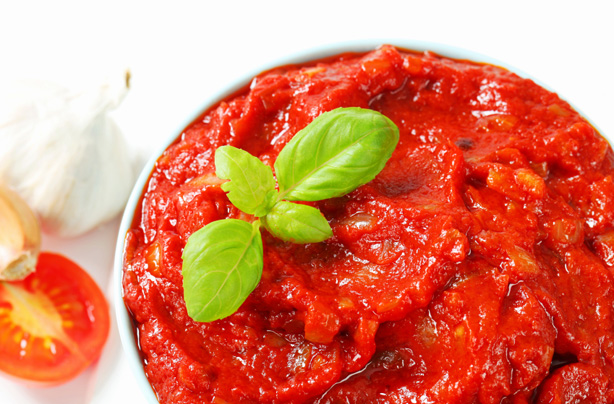
Doctors agree that a diet rich in fresh fruit and vegetables with olive oil is good for your health. Try out the Mediterranean Diet today.
What to eat in your 60s
Calories needed: 1,900
Your needs will be much the same as in your 50s, as long as your activity level doesn't change. As we get older our body is less efficient at absorbing vitamins and minerals, so it's important to increase your intake of these to make up for it. Digestive problems can become more common so drinking plenty of water is crucial and as the risk of heart attacks and strokes rises with age, too many saturated fats, smoking and alcohol should be avoided. We also tend to absorb less vitamin D as we get older, which we need for healthy teeth and bones.
Your food rules
- Brazil nuts: They're packed with selenium, which may help boost your protection against cancer (most cases of cancer appear in the over 65s), so aim for a handful, five times a week.
- Marmite: High in folic acid and other B vitamins, all good for brain function, try to get one teaspoon a few times a week. Folic acid can also be found in green veg such as asparagus and broccoli.
- Oily fish, eggs and fortified fat spreads: Try to get at least one of these into your diet at least once a day, to make sure you're getting a good dose of vitamin D into your diet.
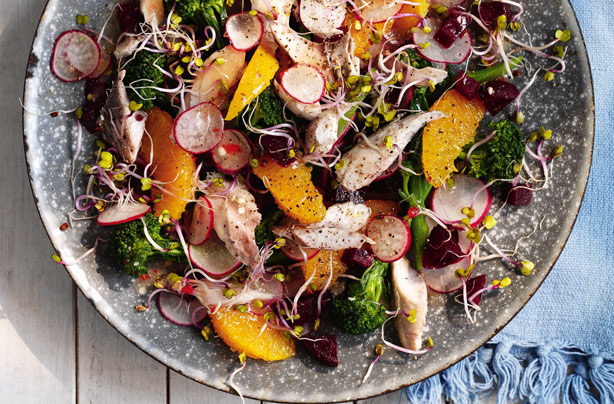
Slimming World's summer mackerel salad is a great lunch option if you want to up your intake of oily fish
What to eat in your 70s
Calories needed: 1,800
Past the age of 75, you'll need only 1,800 calories if you become less active. However, staying as active as you can and getting a little exercise can boost vitality, help you to maintain strength and flexibility, improve mental wellbeing and even relieve pain, so try walking, swimming, gardening or tai chi. You'll find that your appetite is smaller. Zinc rich foods, such as seafood, red meat and grains, can help keep your tastebuds perky.
Your food rules:
- Liver: Very rich in vitamin D and vitamin B12, which are beneficial for older people, once a week is a good amount to aim for.
- Wheatgerm: A great source of anti-ageing vitamin E, aim for one tablespoon daily.
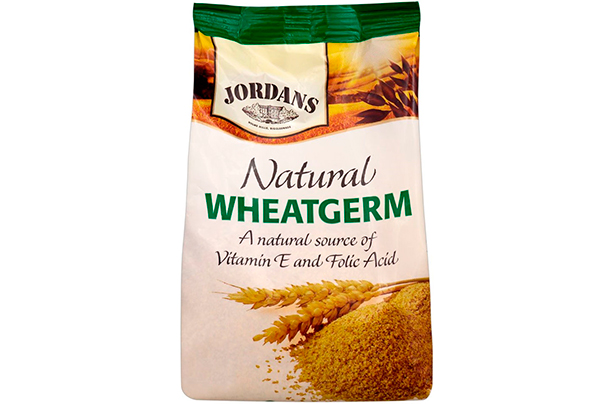
Buy a bag of Jordans natural wheatgerm to up your amount of vitamin E and folic acid. You can sprinkle on salads or breakfast, add to savoury dishes or blend with fruit juice!
Where to next?
-How to look younger: video tutorial